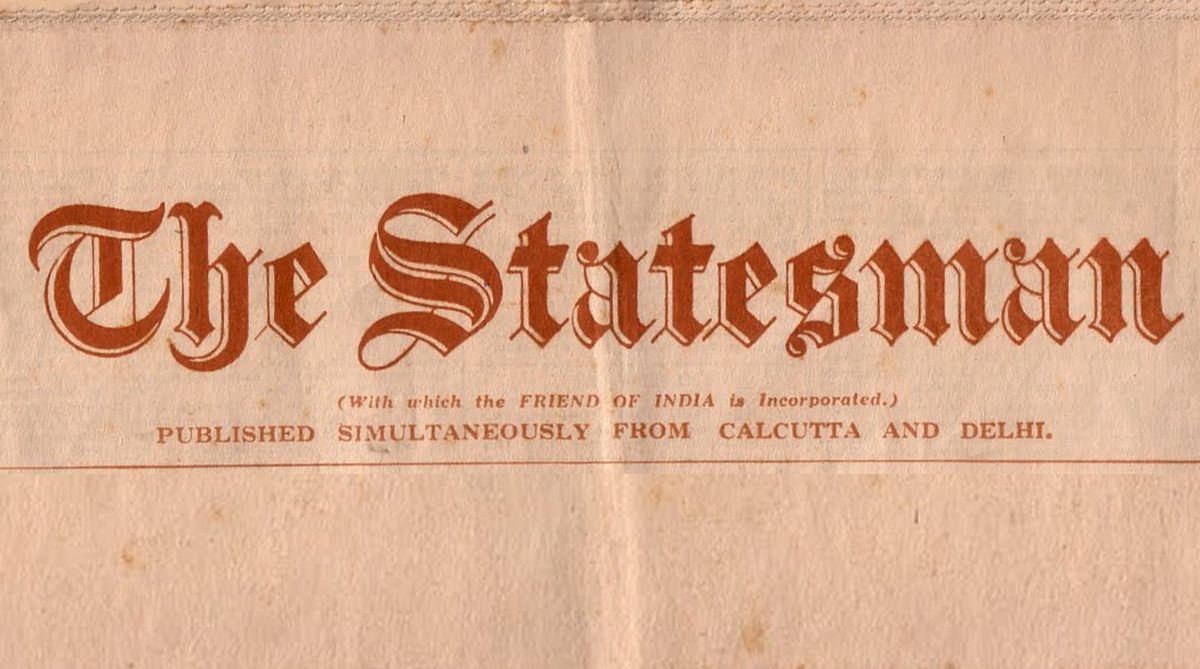A New Day, A New Dawn
There is a surprise for the readers. A special Poila Boishakh gift from none other than West Bengal chief minister Mamata Banerjee. Who has written a piece for this special edition.
On this day a century ago, these were some of the news items The Statesman readers got to read about India and the world.

OCCASIONAL NOTE
The address of General Sykes on the subject of long-distance aviation is suggestive of the difficulty still involved in crossing the sea by aeroplane. The route to India proposed by General Sykes was direct to Marseilles and thence to Taranto, on the heel of Italy, Crete, Sollum, at the extreme north-west corner of Egyptian territory, Mersa Matruch on the Egyptian coast, Cairo, Damascus, Bagdad, Basra and so by degrees to Karachi. General Sykes referred to the problem of negotiating the long seacrossing of the Mediterranean. From the more or less indirect route he chose it is fairly obvious that the object of the practical aviator is always to keep as near land as possible when he is not actually over it, and to shorten as far as possible his flying stages when he is wholly out of contact with it. The speediest way of negotiating the Mediterranean would be to take the crossing at a single flight from Marseilles to Tunis (560 miles). The remainder of the journey to India would then be by land and its worst terrors would be over. General Sykes, however, prefers the mixed sea and land journey from Marseilles to Taranto and from Taranto to Crete, and only between Crete and Sollum (250 miles) does he commit himself to an entire oversea stage and that is a short one. Similar considerations are leading the Mediterranean enthusiasts to concentrate on the possibilities of the Azores as a starting place for the American trip which, according to latest ideas, would end not at Newfoundland – now out of favour on the ground of mist – but near New York.
BOMBAY STRIKES BOMBAY,
Advertisement
JAN 18
The mill-hands strike still continues but quietness prevails in the mill districts. The necessary military and police precautions are being maintained. This morning a meeting of mill-hands was held in an open space behind the Crescent Mill when addresses were delivered advising the strikers not to be rowdy or do anything against the law. The spokesmen also advised the men to stick together and not to work unless the mill-owners put up notices granting their demand. A number of representative employees of almost all the mills waited on the Commissioner of Police at headquarters at Jacob’s Circle at noon today. They numbered about three hundred and consisted of spokesmen from the different mills. The workmen represented to Mr. Vincent that they had been without work for the past ten days and were idling away their time, and that there was no one to lead them on the right track.
THE TELEGRAPHISTS PAY DELHI,
JAN 18
A resolution has been issued today in the Commerce and Industry Department announcing the decision of the Government of India that, in order to maintain the standard of recruitment as telegraphists of men who should be capable of rising to the more important charges now open to telegraph subordinates, it is necessary to increase the initial pay both in the general and local service, and to reduce the period for which a telegraphist has to serve before reaching the maximum pay of his service. They have accordingly decided, with the approval of the Secretary of State for India, to introduce revised scales of pay for male telegraphists with effect from the 1st January, 1919. The scale now sanctioned for general service starts from Rs 75, rising to Rs 200 in the nineteenth year; and for local service starting from Rs 50 and rising to Rs 130 in the nineteenth year. It is further stated that a double increment can, as at present, be earned after five years’ service.
GERMAN FORCES ON WESTERN FRONT LONDON,
JAN 18
Reeuter learns that it is believed that there are still over half a million Germans under arms on the western front and that there has been no improvement in the handing over of military material. We cannot yet remove troops from the trans-Caspian regions in view of the necessity of preventing the Bolsheviks from penetrating to north Persia and Khorassan. It is confirmed that the Sibeians have captured thirty thousand Bolsheviks with a thousand machine-guns and much material at Perm. The Siberians have reached the river Kama but the Bolsheviks are advancing further south.
TRANSPORT AGROUND RANGOON,
JAN 18
The Government transport Glenogle, which went ashore in the Rangoon river at Syriam yesterday, has become a total loss. Efforts were made at high tide yesterday afternoon to pull her off, but without success, the tide being lower than in the morning. At low tide during the night she broke her back, and this morning her decks are awash. In order to help to lighten her, between five and six hundred tons of her cargo was removed yesterday. She was bound for Calcutta and was under the order of the Controller of Shipping.
Advertisement